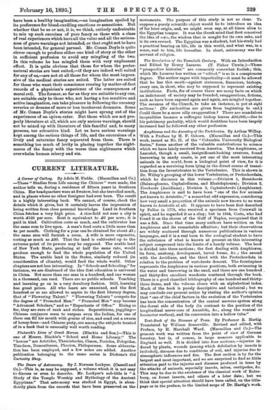CURRENT LITERATURE.
A Corner of Cathay. By Adele M. Fielde. (Macmillan and Co.) —These "Studies from Life among the Chinese" were made, the author tells us, during a residence of fifteen years in Southern China. Her headquarters were at Swatow, but she travelled much, and in places where no other foreigner had ever been. The result is a highly interesting book. We cannot, of course, check the details which it gives, but it certainly leaves the impression of being written from close personal knowledge. Land in Southern China fetches a very high price. A rice-field not near a city is worth £120 per acre. Rent is equivalent to .£6 per acre ; it is paid in kind. Cultivation costs as much, and the cultivator has the same sum to live upon. A man's food costs a little more than 4s. per month. Clothing for a year can be obtained for about £1; the same sum will furnish a room. A wife is more expensive, costing as much as £30. That the land is cultivated up to the extreme point of its powers may be supposed. The arable land of New York State, producing at half the same rate, would produce enough to feed the whole population of the United States. The arable land in the States, similarly reduced (in consideration of climate), would feed the whole world. Other chapters are not less interesting. In " Schools and Schooling," for instance, we are disabused of the idea that education is universal in China. Not more than one man in a hundred, and one woman in a thousand, can read. There are no public schools. Teaching and learning go on in a very desultory fashion. Still, learning has great prizes. All who learn are examined, and the first hundred or so are allowed to aspire to the first literary degree, that of "Flowering Talent." "Flowering Talents" compete for the degree of "Promoted Man." "Promoted Men" may become "Advanced Scholars," and so "Expectants of Office." Rising so far, they are sure of rank and riches. Superstitions, juggling— Chinese conjurers seem to surpass even the Indian, for one of them can fill his mouth with grains of rice, and send out a swarm of honey-bees—and Chinese piety, are among the subjects treated of in a book that is unusually well worth reading.


































 Previous page
Previous page